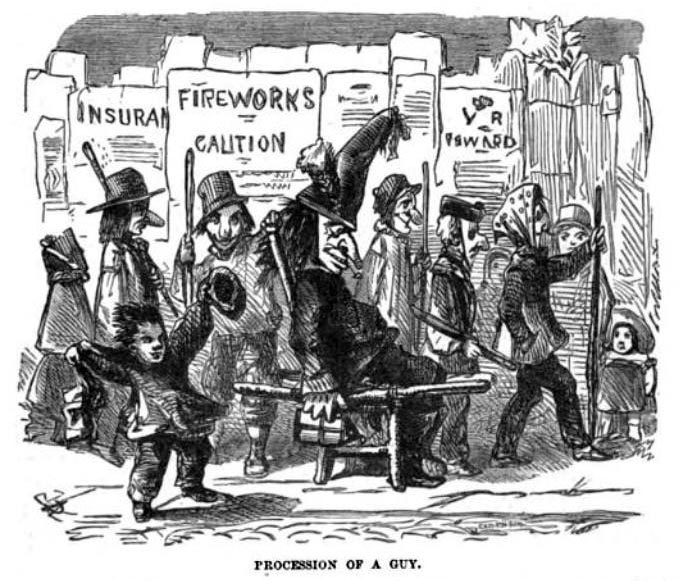G is for Guy
"Please to remember..."

...that "guy" as a generic term for a male is a recent development. This is one of my historical fiction pet peeves (second only to the use of "okay" in stories set before the mid nineteenth century).
As all you Brits will knows, Guy Fawkes was a Catholic in the 16th-17th centuries who was known for his involvement in the Gunpowder Plot to assassinate the protestant King James. (Whether or not he was framed is a question for another day...) Since the early seventeenth century, his arrest and execution have been *tastefully* celebrated on the fifth of November (Guy Fawkes' Day) with fireworks and a burning of his scarecrow-ish effigy.
Because of this, the term "guy," in the nineteenth century, came to mean a poorly-dressed or ridiculous-looking man. It developed to mean a foolish man; I will always remember the noble Tom begging Fanny's forgiveness in An Old-Fashioned Girl by declaring something like, "I'm sorry for being such a guy."
Using the term casually, in a non-derogatory way, to describe a young man, didn't crop up until the mid twentieth century.
So, please...remember. Or I will be forced to call you a guy. In a nineteenth century tone of voice.

...that "guy" as a generic term for a male is a recent development. This is one of my historical fiction pet peeves (second only to the use of "okay" in stories set before the mid nineteenth century).
As all you Brits will knows, Guy Fawkes was a Catholic in the 16th-17th centuries who was known for his involvement in the Gunpowder Plot to assassinate the protestant King James. (Whether or not he was framed is a question for another day...) Since the early seventeenth century, his arrest and execution have been *tastefully* celebrated on the fifth of November (Guy Fawkes' Day) with fireworks and a burning of his scarecrow-ish effigy.
Because of this, the term "guy," in the nineteenth century, came to mean a poorly-dressed or ridiculous-looking man. It developed to mean a foolish man; I will always remember the noble Tom begging Fanny's forgiveness in An Old-Fashioned Girl by declaring something like, "I'm sorry for being such a guy."
Using the term casually, in a non-derogatory way, to describe a young man, didn't crop up until the mid twentieth century.
So, please...remember. Or I will be forced to call you a guy. In a nineteenth century tone of voice.
I had no idea! Tangentially, I hate it when people (especially Southerners, who used to say "y'all") call a group of people, even an all-female group, "you guys." Blech!
ReplyDeleteAlso, my sweet grandmother, who set literary standards for me, never, ever said "okay;" it was "all right."
Wow, the "yous guys" phrase in Buffalo is pretty harsh then. :P
ReplyDeleteIt's really interesting how our language twists and turns and becomes something new. Thanks for sharing :)
ReplyDeleteWhoa...very cool piece of information! Thanks for sharing it with us.
ReplyDeleteVery cool! I've always come at the term "guy" from a sociological perspective. If, as we use it today, it means "man" then why do we refer to a group of mixed gender as "guys?" Very interesting, especially considering this history.
ReplyDeleteThanks! Good luck with the challenge!
Dianna Fielding
sociologyfornerds.com